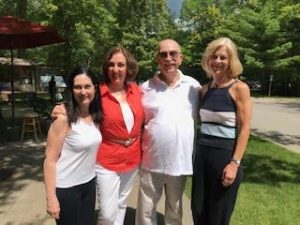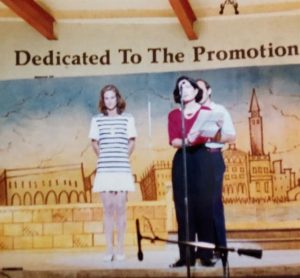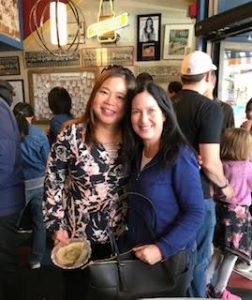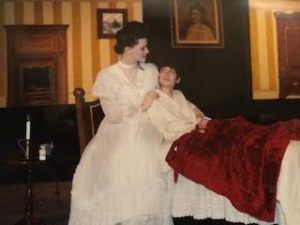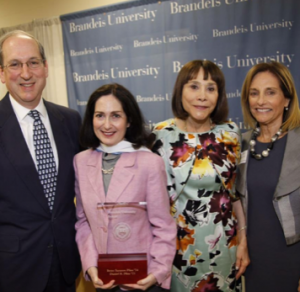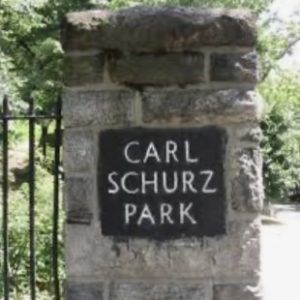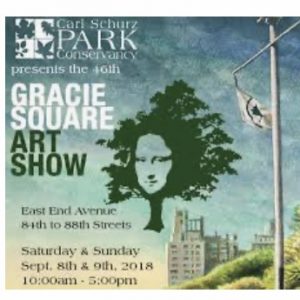I have done a lot of volunteer work in the last 32 years, since retiring from paid employment. I divide that work into two categories: working on behalf of places that benefit my children and giving back to places that helped me become the person I am.
I grew up in a household where my mother engaged in doing a great deal of volunteer work for various Jewish women’s organizations like the National Council of Jewish Women, Hadassah and the Brandeis University National Women’s Committee, which held book fairs, raising money to benefit the young university’s library, but also each chapter had its own study groups. My mother was often an officer of each of these organizations.
My father, who changed careers late in life, moving from the automotive industry to Jewish philanthropy in 1970, became an officer of our Temple when I was in high school. I saw a lot of volunteering modeled by my parents.
The institutions that formed me are the National Music Camp (now the Interlochen Arts Camp), which I attended as a Voice and Drama Major from 1964-1969, made friendships of my lifetime and had mentors that lasted for the duration of their lives. I have already written about lessons learned there from Dude Stephenson, who was pivotal in teaching me that one doesn’t have to be a star to be a leader in Dude – A Message of Love. With many of my close friends, we mourned and celebrated him during the summer of 2018.
Long before then, in 1975, Christie Hefner (on the right in the above photo) and I first visited a year after graduating from Brandeis. We had such a wonderful time that we vowed to visit every summer and we did for 10 years, then I had my first child and Christie was too busy at work, but we would occasionally drop in.
At some point after that time, doing outreach, the Alumni Director visited Christie in Chicago and invited her to join the Alumni Board (which represents the Camp and the Interlochen Arts Academy, an excellent winter boarding school under the auspices of the Interlochen Center for the Arts, which also includes a public radio station and an arts festival). Christie suggested me in her stead.
So, in the early 1990’s, I did join the Interlochen Alumni Board and met a diverse group of wonderful people. I served for six years, the last four as the Corresponding Secretary. We met at Interlochen in northern Michigan three times a year. I had never been there in the fall or spring; both glorious times of the year. During my tenure on the Board, I arranged for Mike Wallace to receive the Distinguished Alumni Award (as I described on this site last summer). Christie won the award in 1995 and I was thrilled to be part of that presentation.
A new theatre was built in 1998. I led a successful fundraising drive to name the lobby after Dude and his brother Jim Bob, who had led University Drama (for years the camp had a close affiliation with the University of Michigan), then became Dude’s assistant with the Operetta program. I suggested a Senior Dinner for the Academy, held during our Spring board meeting, as a way for Seniors who might be coming into our communities for college or conservatory, to meet Board members and have a local connection. It became a much-anticipated tradition.
Back home, in the Boston area, I held alumni recitals in my home and entertained the Alumni Director and local alumni when she’d come to town. I housed visitors from the Academy when they came to Boston for auditions. I became lifelong friends with one. Here we are when she visited just a year ago, while her teenage daughter played in a soccer tournament. She was her daughter’s age when we first met.
And Christie and I funded a half scholarship to benefit an operetta performer for years, but that was outside my Alumni Board duties. That was something we did to fulfill a special request from Dude. That was our pleasure. We stopped giving when the camp program dropped from an eight week to a six week session and Dude ended the Operetta program. The scholarship was no longer needed.
Brandeis found me early. I’ve never missed a reunion and since I’m married to an alum from the Class of ’73, I usually go to the reunion the year before mine as well (he skipped his 45th, so I didn’t go either). I began working on reunions with my 15th and have worked on every one since, co-chairing my 25th, 30th, 40th and 45th (that includes asking to fund our Reunion Gift, a task I do not enjoy, but find a way to do anyway). The Featured Photo was taken at the Saturday night dinner of my 40th reunion in 2014. I wrote about those in Chair For Life.
In addition to reunions, I’ve been on three Arts Councils, including the original, chaired by Jon Landau, ’68 (Bruce Springsteen’s manager) which envisioned setting up an Office of the Arts. Happily, this came to fruition. I sat on the current iteration for five years. We each contributed money, which was apportioned to fund grant requests from the three departments comprising the School of Fine Arts which couldn’t be funded by Brandeis. That was satisfying.
The place that has been my passion for more than three decades is the Rose Art Museum. I was first invited to come to a lecture by my mother-in-law’s best friend, Lois Foster (friends since they were 15 year olds in high school). She was the Rose’s major benefactor. I attended that first lecture with my 7 month old nursing baby in tow. I was hooked.
I began attending lectures and openings regularly. Dan and I were modest collectors and I always enjoyed looking and learning about art. This was a marvelous way to do it. I became close to that current director, going to lunch to discuss what makes art great, and other weighty topics. He was a brilliant man from whom I learned much about contemporary art. I would encourage anyone interested to google “Carl Belz”. He is worth investigating. The greatest lesson I learned from him was to be loyal to the institution, not each passing director. It was a difficult lesson.
I was invited to join a committee that became “Young Patrons of the Rose”, even though I was nine years older than the other “young” patrons. We made it successful and I was invited to join the Board of Overseers.
With one year off, and the years of hiatus when the Rose was closed, I’ve been on it ever since, through five directors and three interim directors. I am currently on the Collections and Development Committees and the Sam Hunter (named for the first director) Emerging Artist Committee. During a calendar year, we “look” (we were ahead of our time – for six seasons we’ve looked at artist’s work virtually, with committee members across the country, the meetings are all virtual as well), then vote on one work by an “emerging” artist to bring into the collection, under the guidance of our curator.
We are working on plans to celebrate our 60th anniversary, fast approaching in 2021.
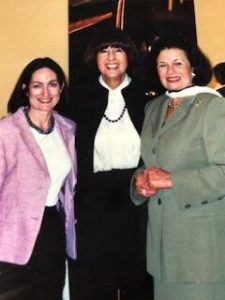
With Lois Foster, major donor to the Rose, and Jill Starr, chair of the Board, when Jill became a Fellow. 2003
It became clear to me by the time Jeffrey was in kindergarten that he was different. His teacher called for volunteers and I answered. Three days every other week, I came into the school to help out for an hour and so that I could keep an eye on him. I helped on “Journal Day”, “Library Day” and “Reading Day”. I didn’t necessarily work with Jeffrey every time I was in the classroom (and during Library period, I was re-shelving books while the librarian read to them), but at least I could watch and intervene if needed. Jeffrey was in a split K/1 and had the same teacher for two school years, so I did the drill for two years. That teacher “got” Jeffrey and we worked well together.
After Jeffrey moved out of the Newton Public School system to his special ed school in 8th grade, the school had an interesting winter curriculum. They spent the whole month of January putting on a major musical. They were given a bit of work to do on their own when they were not rehearsing, but mostly they learned the songs and dance routines and the leads spent long days learning their parts. Most of these children were on the autism spectrum, so were learning about feelings, facial expressions, trust and a variety of other aspects of expression through theater. As a theater major, I got what the head of school was trying to accomplish. We were best buddies from the get-go. The school was 18 miles away. Jeffrey was bused by Newton, but not when the rehearsal schedule had him stay late. Then I’d have to run out to Sudbury to pick him up and usually he was hungry, so we’d go out for dinner immediately after rehearsal.
I looked for a way to be useful. I can’t use a sewing machine, but I can do hand-sewing and ironing and was happy to help in any way possible. It just made sense for me to be there as much as possible. I thought it was also important for Jeffrey to see his mother involved at the school. He eventually flourished there. He had a lead in 9th grade, playing the role of Colin in “The Secret Garden”. Of course, I ran his lines and coached him at home. Years later, parents still came up and told me how moved they were by that performance.
After being swallowed up in 9th grade at large Newton North High School, David transferred to tiny Commonwealth School in Boston’s Back Bay. He took public transporation to and from school, made wonderful friendships and grew into a great, independent thinker. But the school, founded by Charles Merrill, son of the founder of Merrill Lynch, to be the anti-Deerfield Academy, had a hands-off attitude toward parents and no Alumni Organization at all. During David’s junior year, I was invited to be on a task force to look into ways for parents to offer help to the school (beyond writing a check) that wouldn’t be considered too intrusive to its well-established ethos.
I remain friendly with several of the people on the task force. We made our report at the beginning of David’s senior year. We came up with several good, implementable suggestions. Certainly the first was to establish a real Alumni Association, which I had great familiarity with after my years of service at Interlochen.
Another was a college night that parents of seniors would offer to parents of juniors who were stressing the college application process. We had just been through it, could offer our wisdom and assure everyone that they would live through it. The first was held at our house, was a great success and, as far as I know, 17 years later, the evening continues (probably now on Zoom, thanks to COVID).
I have done many other things at Brandeis throughout the years; too numerous to recount here. It remains a hub of my life. To reward me for my commitment, five years ago, Brandeis made me (and Dan, who is an Executive in Residence at the Business School) Fellows of the University.



